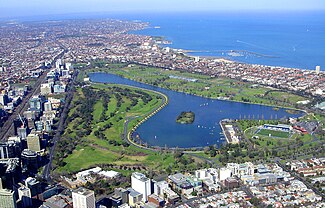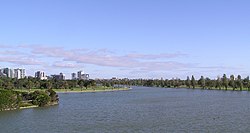Albert Park Lake
| Albert Park | |
|---|---|

Aerial view of Albert Park and Lake
|
|
| Type | Public Park, Lake, Motor Racing Venue |
| Location | Melbourne, Australia |
| Coordinates | 37°50′53″S 144°58′16″E / 37.848°S 144.971°ECoordinates: 37°50′53″S 144°58′16″E / 37.848°S 144.971°E |
| Area | 225 ha (560 acres) |
| Opened | 1864 |
| Operated by | Parks Victoria |
| Status | Open |
| Paths | Sealed shared pedestrian / bicycle paths |
| Terrain | Flat plains; Large lake |
| Water | Albert Park Lake |
| Vegetation | European themed, Australian native, grasslands |
| Connecting transport | Tram, Bus, Car |
| Landmarks | Albert Park Lake, Melbourne Grand Prix Circuit |
| Facilities | Toilets, barbecues, playground, cafe/restaurant |
| Albert Park Lake | |
|---|---|

Albert Park Lake looking south-east from the lookout tower at The Point restaurant.
|
|
| Location | Albert Park, Victoria |
| Coordinates | 37°50′47″S 144°58′12″E / 37.84639°S 144.97000°E |
| Type | Freshwater |
| Basin countries | Australia |
| Surface area | 0.49 km2 (49 ha; 120 acres) |
Albert Park and Albert Park Lake are situated in the City of Port Phillip, Victoria, Australia, 3 km south of the Melbourne CBD.
The park encompasses 2.25 square kilometres (225 ha; 560 acres) of parkland including Albert Park Lake (0.49 square kilometres (49 ha; 120 acres)) and provides numerous ovals, sporting facilities, the Albert Park Public Golf Course, a 5-kilometre (3.1 mi) walking track around the lake, and the Melbourne Grand Prix Circuit. It is bordered by Albert Road, Queens Road, Fitzroy Street and Canterbury Road. Surrounding suburbs include Albert Park, Middle Park, St Kilda, Melbourne and South Melbourne.
Albert Park was originally part of the extensive Yarra River Delta, which involved vast areas of wetlands and sparse vegetation, interspersed by lagoons, some of which were quite large, including the lagoon from which Albert Park Lake was created. The area was occupied by localised tribes of Indigenous Australians, the Wurundjeri people, for around 40,000+ years prior to European settlement, and was one of many sites around Melbourne where regular corroborees (meetings) were held.
Following British settlement from 1835 onwards, much of the Yarra River delta was drained to dry the land and enable agriculture, housing and grazing. Through the 1840s and 1850s, the area now occupied by Albert Park itself was unofficial parkland, used for military training, grazing and hunting. In 1864 the area was officially proclaimed a public park and named Albert Park in honour of Queen Victoria's devoted consort, Prince Albert.
...
Wikipedia
